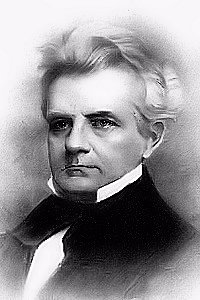Introduction

(1807–1892)
Words: John G. Whittier, 1843. The lyrics come from his poem Seedtime and Harvest.
Music: Ernan Lowell Mason, 1850 (🔊 pdf nwc).

He that in these things serveth Christ is acceptable to God.
Romans 14:18

Words: John G. Whittier, 1843. The lyrics come from his poem Seedtime and Harvest.
Music: Ernan Lowell Mason, 1850 (🔊 pdf nwc).

[These] verses were loved and prized by both [American] President Garfield and President McKinley. On the Sunday before the latter went from his Canton [Ohio], home to his inauguration in Washington the poem was sung as a hymn at his request in the services at the Methodist church where he had been a constant worshiper.
Brown, p. 251
It may not be our lot to wield
The sickle in the ripened field;
Nor ours to hear, on summer eves,
The reaper’s song among the sheaves.
Yet where our duty’s task is wrought
In unison with God’s great thought,
The near and future blend in one,
And whatsoe’er is willed, is done.
And ours the grateful service whence
Comes, day by day, the recompense;
The hope, the trust, the purpose stayed,
The fountain, and the noonday shade.
And were this lift the utmost span,
The only end and aim of man,
Better the toil of fields like these
Than waking dream and slothful ease.
But life, though falling like our grain,
Like that revives and springs again;
And, early called, how blest are they
Who wait in Heaven, their harvest day!
The opening of Whittier’s original poem:
As o’er his furrowed fields which lie
Beneath a coldly-dropping sky,
Yet chill with winter’s melted snow,
The husbandman goes forth to sow.
Thus, Freedom, on the bitter blast
The ventures of thy seed we cast,
And trust to warmer sun and rain,
To swell the germs and fill the grain.
Who calls thy glorious service hard?
Who deems it not its own reward?
Who, for its trials, counts it less
A cause of praise and thankfulness?